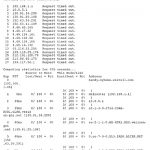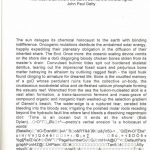Glass Houses: A Reply to Loren Glass’s “Getting With the Program”
Brian LennonBrian Lennon weighs in on developing conversation about Mark McGurl's Program Era; Lennon's response to Loren Glass's riposte argues that Bourdieu's work is invoked by Glass as an answer, not a question, "without any effort to mark...why or how Bourdieu might be right - and without leaving any sense of the debates that generated and refined Bourdieu's positions."
Forgetting Media Studies: Anthologies, Archives, Anachrony
Paul BenzonThrough a close formal analysis of two new critical collections, Paul Benzon ponders the state of media studies as field. Exploring the material and temporal paradoxes of anthologizing new media and posthumanism, he argues that "each of these texts takes shape, succeeds, and fails under the pressures and possibilities posed by the scalar demands of information."
Getting with the Program: A Response to Brian Lennon
Loren GlassLoren Glass argues that Brian Lennon’s review of The Program Era is a “symptom of the very crisis he so ruthlessly anatomizes.” Glass suggests Lennon’s review exaggerates the anti-institutional quality of Mark McGurl’s work while displaying its own anti-institutional bias against naming “the System” it describes.
Gaming the System
Brian LennonIn the wake of massive shifts in the function and purview of the University in the late twentieth and early twenty-first centuries, Brian Lennon considers two recent texts on the system of higher educational institutions and the academic practices that supports it.
Charles Darwin: Conservative Messiah? On Joseph Carroll’s Literary Darwinism
Bruce ClarkeBruce Clarke reviews Joseph Caroll's Literary Darwinism and (like Laura Walls in her review of E.O. Wilson ten years earlier in ebr)identifies the LD project not as "consilience" so much as the
colonization of the literary humanities by one branch of the biological sciences. In Caroll, Clarke discerns a Darwinian fundamentalism to match the Christian fundamentalism that can be observed in Clarke's own Lubbock, TX habitat.
Beyond Representation: Deliberate Reading in a Panarchic World
Laura Dassow Walls
Laura Dassow Walls explores how 'deliberative' reading practices may allow us to weigh the words we hear against the world we cognize - keeping alive the possibility of reading as a moral act.
Strange Sympathies: Horizons of Media Theory in America and Germany
John Durham PetersJohn Durham Peters outlines "the media studies triangle," which consists of textual, social, and institutional approaches. He then stakes out another approach that considers what civilization itself has at stake in media change.
Global Warming, Globalization, and Environmental Literary History
Lance NewmanLance Newman suggests Ecocriticism shares a problematic assumption with "green" capitalism: the idea "a livable future will result from billions of individual ethical decisions." Here he traces a burgeoning critical alternative that investigates the historical connections between global capital and the shifting structures of the "ecosocial."
Review of A Companion to Digital Literary Studies
Scott HermansonScott Hermanson considers the Companion's success in negotiating its own position between digital literature and print media.
Hybrids at hand: the problem of representing the heterotic superstring
Sean Miller
Contrasting conventional notions of representational realism with the leaps of imagination underlying contemporary physics, Sean Miller explores the necessary role of an imaginary in sting theorists' search for a coherent "theory of everything."
Thinking Past Ourselves: Ecology and the Ethics of Cross-Species Partnerships
John BruniJohn Bruni evaluates current proposals for animal rights and green capitalism, questioning whether the legal and economic discourse with which the question of animal life as thus far been bound up will ever allow us, as Cary Wolfe proposes, to think past ourselves.


